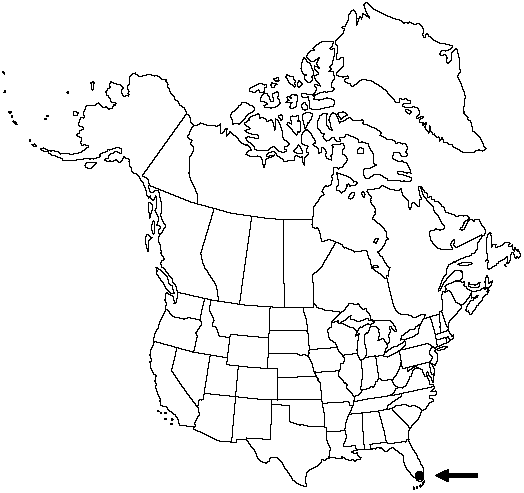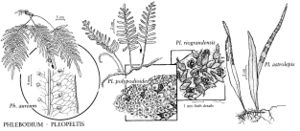Difference between revisions of "Pleopeltis astrolepis"
Mexic. Pl. 1: 87. 1872.
FNA>Volume Importer |
imported>Volume Importer |
||
| (6 intermediate revisions by 2 users not shown) | |||
| Line 8: | Line 8: | ||
}} | }} | ||
|common_names=Star-scaled fern | |common_names=Star-scaled fern | ||
| − | |basionyms={{Treatment/ID/ | + | |special_status={{Treatment/ID/Special_status |
| + | |code=F | ||
| + | |label=Illustrated | ||
| + | }} | ||
| + | |basionyms={{Treatment/ID/Basionym | ||
|name=Polypodium astrolepis | |name=Polypodium astrolepis | ||
|authority=Liebmann | |authority=Liebmann | ||
| + | |rank=species | ||
| + | |publication_title=Kongel. Danske Vidensk. Selsk. Skr., Naturvidensk. Math. Afd., ser. | ||
| + | |publication_place=5, 1: 185. 1849 | ||
}} | }} | ||
|synonyms={{Treatment/ID/Synonym | |synonyms={{Treatment/ID/Synonym | ||
|name=Grammitis elongata | |name=Grammitis elongata | ||
|authority=Swartz (not Polypodium elongatum Aiton) | |authority=Swartz (not Polypodium elongatum Aiton) | ||
| − | }}{{Treatment/ID/Synonym | + | |rank=species |
| + | }} {{Treatment/ID/Synonym | ||
|name=Grammitis lanceolata | |name=Grammitis lanceolata | ||
|authority=Schkuhr | |authority=Schkuhr | ||
| − | }}{{Treatment/ID/Synonym | + | |rank=species |
| + | }} {{Treatment/ID/Synonym | ||
|name=Grammitis revoluta | |name=Grammitis revoluta | ||
|authority=Sprengel ex Willdenow | |authority=Sprengel ex Willdenow | ||
| − | }}{{Treatment/ID/Synonym | + | |rank=species |
| + | }} {{Treatment/ID/Synonym | ||
|name=Pleopeltis revoluta | |name=Pleopeltis revoluta | ||
|authority=(Sprengel ex Willdenow) A. R. Smith | |authority=(Sprengel ex Willdenow) A. R. Smith | ||
| + | |rank=species | ||
}} | }} | ||
|hierarchy=Polypodiaceae;Pleopeltis;Pleopeltis astrolepis | |hierarchy=Polypodiaceae;Pleopeltis;Pleopeltis astrolepis | ||
| Line 38: | Line 49: | ||
|elevation=0 m | |elevation=0 m | ||
|distribution=Fla.;Mexico;West Indies;Central America;South America. | |distribution=Fla.;Mexico;West Indies;Central America;South America. | ||
| − | |discussion=<p>Pleopeltis astrolepis is a common species in tropical America, including the West Indies. The only known North American locality, in Broward County, Florida, was discovered in 1977, and (in 1992) the plants are in danger of extirpation from development.</p> | + | |discussion=<p><i>Pleopeltis astrolepis</i> is a common species in tropical America, including the West Indies. The only known North American locality, in Broward County, Florida, was discovered in 1977, and (in 1992) the plants are in danger of extirpation from development.</p> |
|tables= | |tables= | ||
|references= | |references= | ||
| Line 47: | Line 58: | ||
-->{{#Taxon: | -->{{#Taxon: | ||
name=Pleopeltis astrolepis | name=Pleopeltis astrolepis | ||
| − | |||
|authority=(Liebmann) E. Fournier | |authority=(Liebmann) E. Fournier | ||
|rank=species | |rank=species | ||
| Line 60: | Line 70: | ||
|publication title=Mexic. Pl. | |publication title=Mexic. Pl. | ||
|publication year=1872 | |publication year=1872 | ||
| − | |special status= | + | |special status=Illustrated |
| − | |source xml=https:// | + | |source xml=https://bitbucket.org/aafc-mbb/fna-data-curation/src/2e0870ddd59836b60bcf96646a41e87ea5a5943a/coarse_grained_fna_xml/V2/V2_422.xml |
|genus=Pleopeltis | |genus=Pleopeltis | ||
|species=Pleopeltis astrolepis | |species=Pleopeltis astrolepis | ||
Latest revision as of 20:23, 5 November 2020
Stems long-creeping, branched, ca. 1 mm diam.; scales round to ovate-lanceolate, centrally clathrate with cell luminae clear, pubescent, hairs reddish brown. Leaves to 20 cm, weakly hygroscopic. Petiole conspicuously flattened, sparsely scaly; scales rarely overlapping, margins fringed. Blade linear-elliptic, simple, to 2 cm wide, margins entire, moderately scaly abaxially, sparsely scaly adaxially; scales bicolored, mostly round, less than 0.5 mm wide, centers brown, clathrate, margins transparent, deeply fringed. Venation complexly anastomosing, fertile areoles with several included veinlets. Sori oval to oblong, discrete or often confluent, surficial to shallowly embossed, soral scales attached to receptacle. Spores shallowly and irregularly papillate to verrucose, ca. 58 µm. 2n = 136.
Habitat: Epiphytic in swamps on pond apple (Annona glabra Linnaeus)
Elevation: 0 m
Distribution

Fla., Mexico, West Indies, Central America, South America.
Discussion
Pleopeltis astrolepis is a common species in tropical America, including the West Indies. The only known North American locality, in Broward County, Florida, was discovered in 1977, and (in 1992) the plants are in danger of extirpation from development.
Selected References
None.
